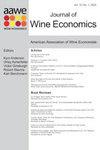Sounds too feminine? Blind tastings, phonetic gender scores, and the impact on professional critics
IF 1.6
4区 经济学
Q2 AGRICULTURAL ECONOMICS & POLICY
引用次数: 0
Abstract
We shed light on assessing product quality in blind tastings and their potential (gender) biases. We study how phonetic traits of grape varieties suggest product attributes in the context of professional reviews. This study aims to close this research gap and analyze how product variety and phonetic name traits affect expert ratings. We obtained data on 18,609 wines and their ratings from Wine Enthusiast Magazine between 1997 and 2016, yielding a sample of 31,058 observations. We suppose that the gender of the taster needs to be considered to understand what affects tastings and ratings, as women and men might be attracted differently to masculine or feminine names. This study shows that masculine names receive higher evaluations than feminine ones. This phonetic gender gap is driven by lower ratings for white wines by female reviewers and lower ratings for red wines by male reviewers. In addition, white wines are rated lower overall by both men and women.听起来太女性化?盲品、语音性别评分以及对专业评论家的影响
我们揭示了盲品中的产品质量评估及其潜在的(性别)偏见。我们研究了葡萄品种的语音特征如何在专业评论中暗示产品属性。本研究旨在填补这一研究空白,分析产品品种和名称语音特征如何影响专家评分。我们从《葡萄酒爱好者》杂志获得了 1997 年至 2016 年间 18,609 种葡萄酒及其评分的数据,从而得到了 31,058 个观察样本。我们认为,要了解品酒和评分的影响因素,需要考虑品酒者的性别,因为女性和男性对男性化或女性化名称的吸引力可能不同。这项研究表明,男性名字获得的评价高于女性名字。女性品酒者对白葡萄酒的评分较低,而男性品酒者对红葡萄酒的评分较低,这就造成了语音上的性别差异。此外,男性和女性对白葡萄酒的总体评价都较低。
本文章由计算机程序翻译,如有差异,请以英文原文为准。
求助全文
约1分钟内获得全文
求助全文
来源期刊

Journal of Wine Economics
Agricultural and Biological Sciences-Food Science
CiteScore
3.20
自引率
28.60%
发文量
33
期刊介绍:
The Journal of Wine Economics (JWE), launched in 2006, provides a focused outlet for high-quality, peer-reviewed research on economic topics related to wine. Although wine economics papers have been, and will continue to be, published in leading general and agricultural economics journals, the number of high-quality papers has grown to such an extent that a specialized journal can provide a useful platform for the exchange of ideas and results.
The JWE is open to any area related to the economic aspects of wine, viticulture, and oenology. It covers a wide array of topics, including, but not limited to: production, winery activities, marketing, consumption, as well as macroeconomic and legal topics. The JWE has been published twice a year and contains main papers, short papers, notes and comments, reviews of books, films and wine events, as well as conference announcements. From 2013 on, the JWE has been published three times per year.
The Journal of Wine Economics is fully owned by the American Association of Wine Economists (AAWE) and, since 2012, has been published by Cambridge University Press.
 求助内容:
求助内容: 应助结果提醒方式:
应助结果提醒方式:


